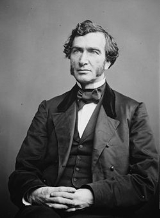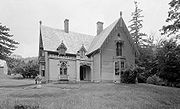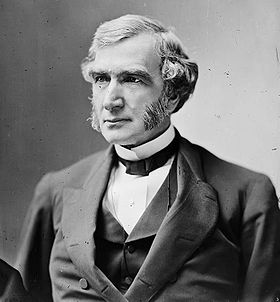
Justin Smith Morrill
Encyclopedia
Justin Smith Morrill was a Representative
(1855–1867) and a Senator
(1867–1898) from Vermont
, most widely remembered today for the Morrill Land-Grant Colleges Act
that established federal funding for establishing many of the United States' public colleges and universities. He was one of the founders of the Republican Party
.
, Morrill attended the common schools, Thetford Academy
and Randolph Academy. While he never attended university, he was granted an honorary degree from the University of Pennsylvania in 1884. He worked as a merchant’s clerk in Strafford 1825–1828 and in Portland
, Maine
, 1828–1831; merchant in Strafford 1831–1848; engaged in agriculture and horticulture 1848–1855. He was initiated into the Delta Upsilon Fraternity as an honorary member in 1860.
In 1854 Morrill was elected as a Whig to the Thirty-fourth Congress and as a Republican to the five succeeding Congresses (March 4, 1855–March 4, 1867). He was the author of the Tariff Act of 1861
as well as the college land-grant act mentioned above. He served as chairman of the Committee on Ways and Means in the Thirty-ninth Congress. As a congressman, he served on the Joint Committee on Reconstruction
which drafted the Fourteenth Amendment to the United States Constitution
.
 In 1866 Morrill was elected as a Union Republican to the U.S. Senate. He was reelected as a Republican
In 1866 Morrill was elected as a Union Republican to the U.S. Senate. He was reelected as a Republican
in 1872, 1878, 1884, 1890, and again in 1896, and served from March 4, 1867, until his death, almost thirty-one years. He served as chairman of the Committee on Public Buildings and Grounds (Forty-first through Forty-fourth Congresses) where he played a vital role in obtaining the current Library of Congress
main building through his work on the Joint Select Committee on Additional Accommodations for the Library. He also served on the Committee on Finance (Forty-fifth, Forty-seventh through Fifty-second, Fifty-fourth and Fifty-fifth Congresses), as regent of the Smithsonian Institution
1883–1898 and as trustee of the University of Vermont
1865–1898. He died in Washington, D.C.
, December 28, 1898. He is buried in Strafford Cemetery in Strafford, Vermont.
 Justin Smith Morrill is most widely known for sponsoring the Morrill Act, also known as the Land Grant College Act
Justin Smith Morrill is most widely known for sponsoring the Morrill Act, also known as the Land Grant College Act
. This act was signed into law by President Abraham Lincoln in 1862. This act established federal funding for higher education in every state of the country. In his own words:
Many colleges established under this act have a 'Morrill Hall' named in honor of Justin Smith Morrill's contribution to higher education. In 1999, the U.S. Postal Service issued a 55¢ Great Americans series
postage stamp of Morrill to honor his role in establishing the land grant colleges, the forerunners of many state universities.
He also authored the Morrill Anti-Bigamy Act
of 1862, which targeted The Church of Jesus Christ of Latter-day Saints, based on the then-existing practice of plural marriage
(polygamy). On January 6, 1879, in Reynolds v. United States
the Supreme Court
, upheld the Anti-Bigamy Act's ban on plural marriage.
The Morrill Tariff
of 1861 was a protective tariff law adopted on March 2, 1861. Morrill was its House sponsor; he designed it with the advice of Pennsylvania economist Henry C. Carey. It was one of the last acts signed into law by President James Buchanan, a Democrat from the pro-tariff state of Pennsylvania. The Morrill Tariff replaced the Tariff of 1857, which was considered favorable to free trade. Two additional tariffs sponsored by Rep. Morrill, each one higher, were passed during Lincoln's administration to raise urgently needed revenue during the Civil War.
The Morrill tariff was adopted against the backdrop of the secession movement, and provided an issue for secessionist agitation in some southern states. The law's critics compared it to the 1828 Tariff of Abominations that sparked the Nullification Crisis, although its overall rate was significantly lower.
United States House of Representatives
The United States House of Representatives is one of the two Houses of the United States Congress, the bicameral legislature which also includes the Senate.The composition and powers of the House are established in Article One of the Constitution...
(1855–1867) and a Senator
United States Senate
The United States Senate is the upper house of the bicameral legislature of the United States, and together with the United States House of Representatives comprises the United States Congress. The composition and powers of the Senate are established in Article One of the U.S. Constitution. Each...
(1867–1898) from Vermont
Vermont
Vermont is a state in the New England region of the northeastern United States of America. The state ranks 43rd in land area, , and 45th in total area. Its population according to the 2010 census, 630,337, is the second smallest in the country, larger only than Wyoming. It is the only New England...
, most widely remembered today for the Morrill Land-Grant Colleges Act
Morrill Land-Grant Colleges Act
The Morrill Land-Grant Acts are United States statutes that allowed for the creation of land-grant colleges, including the Morrill Act of 1862 and the Morrill Act of 1890 -Passage of original bill:...
that established federal funding for establishing many of the United States' public colleges and universities. He was one of the founders of the Republican Party
Republican Party (United States)
The Republican Party is one of the two major contemporary political parties in the United States, along with the Democratic Party. Founded by anti-slavery expansion activists in 1854, it is often called the GOP . The party's platform generally reflects American conservatism in the U.S...
.
Biography
Born in Strafford, VermontStrafford, Vermont
Strafford is a town in Orange County, Vermont, United States. The population was 1,045 at the 2000 census. The town of Strafford was created on August 12, 1761 by way of a royal charter which King George III of England issued to Governor Benning Wentworth of New Hampshire...
, Morrill attended the common schools, Thetford Academy
Thetford Academy
Thetford Academy is a historic independent school in Thetford, Vermont. It is the state's oldest secondary school.The co-educational school was founded in February 1819 by local citizens and was granted a charter by the legislature in October of the that same year...
and Randolph Academy. While he never attended university, he was granted an honorary degree from the University of Pennsylvania in 1884. He worked as a merchant’s clerk in Strafford 1825–1828 and in Portland
Portland, Maine
Portland is the largest city in Maine and is the county seat of Cumberland County. The 2010 city population was 66,194, growing 3 percent since the census of 2000...
, Maine
Maine
Maine is a state in the New England region of the northeastern United States, bordered by the Atlantic Ocean to the east and south, New Hampshire to the west, and the Canadian provinces of Quebec to the northwest and New Brunswick to the northeast. Maine is both the northernmost and easternmost...
, 1828–1831; merchant in Strafford 1831–1848; engaged in agriculture and horticulture 1848–1855. He was initiated into the Delta Upsilon Fraternity as an honorary member in 1860.
In 1854 Morrill was elected as a Whig to the Thirty-fourth Congress and as a Republican to the five succeeding Congresses (March 4, 1855–March 4, 1867). He was the author of the Tariff Act of 1861
Morrill Tariff
The Morrill Tariff of 1861 was a protective tariff in the United States, adopted on March 2, 1861 during the administration of President James Buchanan....
as well as the college land-grant act mentioned above. He served as chairman of the Committee on Ways and Means in the Thirty-ninth Congress. As a congressman, he served on the Joint Committee on Reconstruction
United States Congress Joint Committee on Reconstruction
The Joint Committee on Reconstruction, also known as the Joint Committee of Fifteen, was a joint committee of the United States Congress that played a major role in Reconstruction in the wake of the American Civil War...
which drafted the Fourteenth Amendment to the United States Constitution
Fourteenth Amendment to the United States Constitution
The Fourteenth Amendment to the United States Constitution was adopted on July 9, 1868, as one of the Reconstruction Amendments.Its Citizenship Clause provides a broad definition of citizenship that overruled the Dred Scott v...
.

Republican Party (United States)
The Republican Party is one of the two major contemporary political parties in the United States, along with the Democratic Party. Founded by anti-slavery expansion activists in 1854, it is often called the GOP . The party's platform generally reflects American conservatism in the U.S...
in 1872, 1878, 1884, 1890, and again in 1896, and served from March 4, 1867, until his death, almost thirty-one years. He served as chairman of the Committee on Public Buildings and Grounds (Forty-first through Forty-fourth Congresses) where he played a vital role in obtaining the current Library of Congress
Library of Congress
The Library of Congress is the research library of the United States Congress, de facto national library of the United States, and the oldest federal cultural institution in the United States. Located in three buildings in Washington, D.C., it is the largest library in the world by shelf space and...
main building through his work on the Joint Select Committee on Additional Accommodations for the Library. He also served on the Committee on Finance (Forty-fifth, Forty-seventh through Fifty-second, Fifty-fourth and Fifty-fifth Congresses), as regent of the Smithsonian Institution
Smithsonian Institution
The Smithsonian Institution is an educational and research institute and associated museum complex, administered and funded by the government of the United States and by funds from its endowment, contributions, and profits from its retail operations, concessions, licensing activities, and magazines...
1883–1898 and as trustee of the University of Vermont
University of Vermont
The University of Vermont comprises seven undergraduate schools, an honors college, a graduate college, and a college of medicine. The Honors College does not offer its own degrees; students in the Honors College concurrently enroll in one of the university's seven undergraduate colleges or...
1865–1898. He died in Washington, D.C.
Washington, D.C.
Washington, D.C., formally the District of Columbia and commonly referred to as Washington, "the District", or simply D.C., is the capital of the United States. On July 16, 1790, the United States Congress approved the creation of a permanent national capital as permitted by the U.S. Constitution....
, December 28, 1898. He is buried in Strafford Cemetery in Strafford, Vermont.
Legislation

Morrill Land-Grant Colleges Act
The Morrill Land-Grant Acts are United States statutes that allowed for the creation of land-grant colleges, including the Morrill Act of 1862 and the Morrill Act of 1890 -Passage of original bill:...
. This act was signed into law by President Abraham Lincoln in 1862. This act established federal funding for higher education in every state of the country. In his own words:
- "This bill proposes to establish at least one college in every State upon a sure and perpetual foundation, accessible to all, but especially to the sons of toil, where all of needful science for the practical avocations of life shall be taught, where neither the higher graces of classical studies nor that military drill our country now so greatly appreciates will be entirely ignored, and where agriculture, the foundation of all present and future prosperity, may look for troops of earnest friends, studying its familiar and recondite economies, and at last elevating it to that higher level where it may fearlessly invoke comparison with the most advanced standards of the world."
- —1862, as quoted by William Belmont Parker, The Life and Public Services of Justin Smith Morrill
Many colleges established under this act have a 'Morrill Hall' named in honor of Justin Smith Morrill's contribution to higher education. In 1999, the U.S. Postal Service issued a 55¢ Great Americans series
Great Americans series
The Great Americans series is a set of definitive stamps issued by the United States Postal Service, starting on December 27, 1980 with the 19¢ stamp depicting Sequoyah, and continuing through 2002, the final stamp being the 78¢ Alice Paul self-adhesive stamp. The series, noted for its simplicity...
postage stamp of Morrill to honor his role in establishing the land grant colleges, the forerunners of many state universities.
He also authored the Morrill Anti-Bigamy Act
Morrill Anti-Bigamy Act
The Morrill Anti-Bigamy Act was a federal enactment of the United States Congress that was signed into law on July 8, 1862 by President Abraham Lincoln...
of 1862, which targeted The Church of Jesus Christ of Latter-day Saints, based on the then-existing practice of plural marriage
Plural marriage
Polygamy was taught by leaders of The Church of Jesus Christ of Latter-day Saints for more than half of the 19th century, and practiced publicly from 1852 to 1890.The Church's practice of polygamy has been highly controversial, both within...
(polygamy). On January 6, 1879, in Reynolds v. United States
Reynolds v. United States
Reynolds v. United States, , was a Supreme Court of the United States case that held that religious duty was not a suitable defense to a criminal indictment...
the Supreme Court
Supreme Court of the United States
The Supreme Court of the United States is the highest court in the United States. It has ultimate appellate jurisdiction over all state and federal courts, and original jurisdiction over a small range of cases...
, upheld the Anti-Bigamy Act's ban on plural marriage.
The Morrill Tariff
Morrill Tariff
The Morrill Tariff of 1861 was a protective tariff in the United States, adopted on March 2, 1861 during the administration of President James Buchanan....
of 1861 was a protective tariff law adopted on March 2, 1861. Morrill was its House sponsor; he designed it with the advice of Pennsylvania economist Henry C. Carey. It was one of the last acts signed into law by President James Buchanan, a Democrat from the pro-tariff state of Pennsylvania. The Morrill Tariff replaced the Tariff of 1857, which was considered favorable to free trade. Two additional tariffs sponsored by Rep. Morrill, each one higher, were passed during Lincoln's administration to raise urgently needed revenue during the Civil War.
The Morrill tariff was adopted against the backdrop of the secession movement, and provided an issue for secessionist agitation in some southern states. The law's critics compared it to the 1828 Tariff of Abominations that sparked the Nullification Crisis, although its overall rate was significantly lower.
Further reading
- Cross, Coy F. Justin Smith Morrill Father of the Land-Grant Colleges. Michigan State University Press: 1999. ISBN 9780870135088.
- Memorial Address on the Life and Character of Justin S. Morrill. Government Printing Office: 1899.

